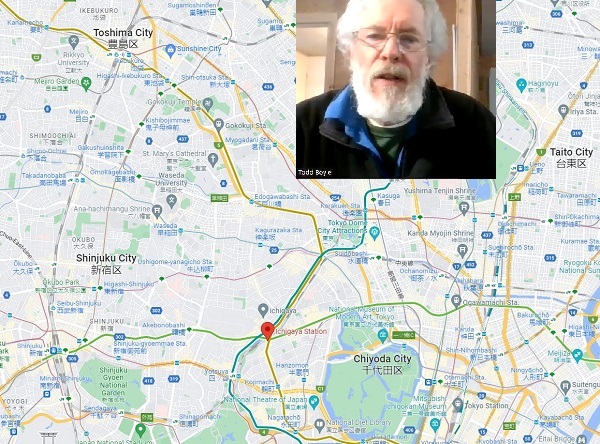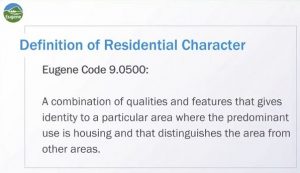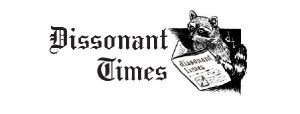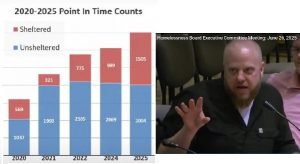Todd Boyle picks some top stories of 2022
9 min read
Housing, Tina, Claire, and questions about EmX
Top local news stories from the year in review.
[00:00:05] Todd Boyle (KEPW contributor): One of the other top stories of 2022 has to do with the way our media works here in Eugene. The 2022 story was the Gannett outlet here, the formerly-great Register-Guard. The Gannett Corporation told all their 250-odd newspapers to stop carrying op-ed pages. No local opinion pieces, no guest opinions, and no letters to the editor.
[00:00:27] And so now, we don’t have op-ed anymore in our main daily newspaper, and there’s no other daily newspaper to provide a central place, you know, a central town forum. That’s what the Register-Guard used to have. And instead of going from one page to zero pages of letters to the editor, they should go from one page to two pages.
[00:00:46] And of course, our two broadcast stations both are owned by national chains. KVAL is owned by Sinclair, which is notorious, you know, very slick design of their news to selectively omit things that are harmful to conservative agendas, and incidentally, include things that are misleading or damaging to progressive agendas. And so Sinclair is notorious. There should be a nationwide movement among all the cities. I’ve written to the City Council that they should join with other mayors and get together and get some local coverage.
[00:01:18] And likewise, KEZI has changed hands several times. Now it belongs to Allen Media, which is some billionaire, I think he’s in Georgia, although his corporation might be in LA area. So I’m mad about it (laughing).
[00:01:34] John Q: The former Speaker of the House helped pass a series of state mandates, then won a tough election for governor.
[00:01:41] Todd Boyle: I think the election of Tina Kotek was a remarkable story. And I was going to drill down on the effort to run Betsy Johnson. And so this is like a classic divide-the-left tactic, basically dirty tricks by the Republican Party.
[00:01:56] Heavily funded—I mean, the list of the donors—all these old timber families, old wealth, the old guard, aristocracy of Oregon, it’s all based on resources extraction. If it’s not coal, it’s fish or oil ports, the oil and gas and coal ports.
[00:02:14] And I think the fact that Tina Kotek won is a validation of her work on middle housing, which I happen to track closely. Which, many people were upset about and they said it wasn’t democratic and the people of Oregon wouldn’t stand for it, the state of Oregon made it illegal for cities to block Accessory Dwelling Units (ADUs). Eugene, the city council and the staff of Eugene filed several protests because they wanted to continue blocking accessory dwelling units in various ways.
[00:02:39] The same thing happened with House Bill 2001, which was the middle housing reform bill, which prohibited cities from blocking most duplex, threeplex, fourplexes, and on all R-1 residential properties, of which there’s 50,000 of those in Eugene.
[00:02:55] Okay. Then there was also Senate Bill 458, in 2020, and that went further to say that if you build middle housing, the duplexes, three-plexes in every neighborhood, any neighborhood—not on every lot, but new construction—then that middle housing may be subdivided and sold as separate lots.
[00:03:13] And this is really historic. And this is only housing. They did many things on law and order issues. They did many things on guns.
[00:03:21] John Q: Another notable local election in 2022, the historic recall of a sitting Eugene city councilor. Recall organizers hope to reverse the council’s approval for another EmX line.
[00:03:36] Todd Boyle: The substance of the complaint was about LTD’s expansion of River Road and I happen to agree with their (opponents’) perspective that River Road as it is today is the best street in the entire world.
[00:03:48] When I go there, I don’t drive, of course, but when I go to River Road and when I’m any place out in Santa Clara-River Road, if I want to get home fast, then the best place to get on is River Road ‘cause it’s totally straight. It’s perfectly safe.
[00:04:03] And there’s a great big wide bike lane about 10 feet wide and you could just get out there and hump on your bike and go down River Road. And I don’t need any turnouts. What are they telling me I need a turnout or I need safety barriers, or something like that.
[00:04:16] And furthermore, the buses, I happen to live right by 30th Avenue here, and I watch the LTD buses go up and down here. There’s like four buses an hour up and down to LCC (Lane Community College), and I look very closely at who’s inside the buses.
[00:04:30] And there’s very seldom more than one person, except between 8 (a.m.) and 9 a.m. when probably 15 people take the bus up the hill, which could easily be carried on something like the airport-hotel buses. And this is on rare occasions, I’m telling you right now.
[00:04:46] And so anyway, this goes on and on, during the times when LCC (Lane Community College) is not even at session, LTD runs these buses up and down the hill here, and then they tell me that this is green and this is saving the environment?
[00:04:57] What a waste of money!
[00:04:58] It’s the same with the electrification problem, where Eugene is considering gradually phasing out the use of natural gas, starting with new connections.
[00:05:09] Many of the people who testified (and should be listened to) opposing the electrification ordinance question whether this is going to do anything meaningful to reduce Eugene’s greenhouse gas emissions.
[00:05:21] The point that I’m trying to make, that’s the same as the LTD on River Road: Are these measures that we’re spending money on that are affecting people very much, are they going to actually achieve the intended, what they said the goals are? Or in fact, in both cases, are these measures actually driven by some vested interest who’s quite opaque and nobody’s—actually none of us has the ability to find—like LTD and the transportation-construction-industrial complex?
[00:05:54] I want to discuss the dynamics, the underlying assumptions behind the idea of a hub-and-spoke EmX, in fact, the entire LTD plan and I think it was—the concrete was poured and the downtown bus center was built and the schedules were laid down under assumptions that not only that, if you build it, then gradually people will ride it and use their cars less and some people will not need cars. But also it was built under an assumption that Eugene will become a larger city like San Jose or something where bus rapid transit makes a lot of sense.
[00:06:29] Any hub-and-spoke system of transportation, of course, it tends to be designed that way by downtown interest.
[00:06:34] It doesn’t matter what city you’re in, in the entire world, but I lived in Tokyo from 1982 to ‘97. I lived over there 14 years because there was a gap. But I lived about a 45-minute commute to downtown on one of the train lines, and I was on the Keiyo line, but there were many hub-and-spoke train lines that went out from downtown Tokyo.
[00:06:57] And there’s a particular hub just as you get into Central Tokyo, it’s called Shinjuku Station. And Shinjuku had more than 3 million people passing through that station every day. And that is the biggest transfer hub and still is today, as far as I’ve heard.
[00:07:10] But one of the reasons why I had no contact with any other Americans or other English or Australians was because I was on one of these hub-and-spokes, and if we ever wanted to get together and talk, you have to take the train all the way down to Shinjuku, and that would be if they happened to be on that particular wedge of downtown where most of my friends might have been down towards Yokohama or up and towards Chiba or somewhere.
[00:07:33] And there’s these enormous transfer times and I’m telling you, these trains and subways are not efficient. In fact, I got so fed up with it for an interval for about five or six years that I had a bike downtown at my office which was down in the southern half, you know, and it would be easier for me, faster for me to get on my bike and ride my bike through heavy traffic where you had about a 12-inch-wide section of curve to just pass all the stalled traffic. It was very safe. The traffic wasn’t moving five mile-an-hour and so you just go (pantomimes pedaling furiously).
[00:08:05] You could cut literally 20 minutes off of your commute time if you just rode the bicycle up to Ichigaya station and take your bike and cruise it into a bush and hop on the train.
[00:08:15] And Tokyo, people didn’t steal bikes because they had less than zero value. There were so many bicycles that they would pile up in great big, huge heaps in front of train stations and the cities would come around with forklifts and take all these bicycles and pick ’em up because they were causing congestion on streets in front of the station.
[00:08:31] But basically the transit system, people would say, ‘Oh, we’ve got to have mass transit.’ And I’m going to say: ‘Be careful what you wish for.’ Because mass transit, especially in the United States, the transit system is always a line system. It’s not an area system, and nobody can get to the line. And even if they can get to the line, they can’t get to stations that can be economically supportive.
[00:08:50] Like on the McKenzie, there might be a station in front of Leaburg and then the next station’s in front of Vida and the next station is up in Finn Rock and next station is up in Blue River. What about all the other people who, how many, how far are they supposed to walk before they get to a bus stop? And it only comes twice a day. Mass transit is not the answer. The answer is micro-electric.
[00:09:11] Where to put transit routes should be based on how many people are actually going to ride it at the present time and not based on some assumptions of growth. LTD should publish quite detailed data, a web interface where I could type in, let’s say the 81 bus or the 82 bus to LCC (Lane Community College).
[00:09:31] And then I should be able to examine how many riders or rider-miles have been carried. And if you drill down all the way, then you should be able to say how many people got on in Eugene before 18th.
[00:09:45] Under any reasonable assumptions, the 82 Express bus—a great big elongated, humongous, 20-ton bus—it should have some riders by the time it passes the Safeway there on Pearl Street, on the way out of downtown. And I should be able to see how many people got on by the time it goes over the hill.
[00:10:06] And then I should be able to cruise over and see what is the fuel consumption of the 82 bus and what’s the efficiency by segment of the 82 bus in terms of fuel consumption per passenger for that segment.
[00:10:21] We have a right to understand whether the buses that are rolling through this particular community are even environmentally useful. We know they’re not. We know that it’s costing us money. And my question is whether it’s achieving the thing that it was intended to achieve, which goes back to one of my earlier themes.
[00:10:39] If we do electrification instead of using natural gas, is it going to achieve reduction in greenhouse gases, net? Many people are complaining about this. It’s impossible to evaluate whether LTD is any good if they withhold information about the fuel efficiency of its buses, and I’m a liberal, you know, I want to address greenhouse gases, and I’m not an anarchist and I’m not a Republican. I just want the information, you know.
[00:11:04] John Q: Todd Boyle with several of his picks for the year’s top stories. Changes at the Register-Guard. The election of Tina Kotek endorses state mandates on housing. And the recall of Claire Syrett suggests that LTD should start sharing ridership data for its EmX bus system.



